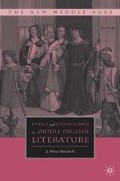Abstract
John Lydgate’s Fall of Princes (c. 1431–38) is both ambiguous and articulate about the eventful matters it chronicles. Recounting scores of verse tragedies—from the loss of Eden through to fairly recent events in European history—Lydgate’s Fall depends for its contents and effects on so many spectacular reversals of fortune. Lydgate’s immediate source for the work is Laurent de Premierfait’s Des Cas de nobles hommes et femmes (1409), a French prose redaction of Boccaccio’s De casibus virorum illustrium (1355–60), yet from the standpoint of the fiction itself all the historical narratives contained in the work originally come down to medieval writers as gifts of Fortune. The sixth book of Lydgate’s Fall represents the scene of the initial donation. Fortune comes as an apparition—in an episode clearly evocative of Lady Philosophy’s visitation at the beginning of Boethius’s Consolation of Philosophy—to bestow on the de casibus author (“Bochas”) the very substance of the work, or at least part of the work, that is the Fall of Princes.3 As we will see, in this particular book the poet becomes a recipient of over a dozen histories drawn from Fortune’s store of tragic occurrences, her “secre bosum … ful of stories” (6.309). Lydgate looks on these gifts with considerab le suspicion, but he is expressly indebted to them when it comes to his stated aim.
What else does the clamor of tragedies bewail but Fortune overthrowing happy kingdoms with an unexpected blow? Boethius, Consolation of Philosophy1 We want historians to confirm our belief that the present rests upon profound intentions and immutable necessities. But the true historical sense confirms our existence among countless lost events, without a landmark or a point of reference…. The forces at work in history are ruled neither by a destination nor by a mechanics, but rather by the luck of the battle. Foucault, “Nietzsche, Genealogy, History”2
Access this chapter
Tax calculation will be finalised at checkout
Purchases are for personal use only
Preview
Unable to display preview. Download preview PDF.
Notes
Boethius, The Consolation of Philosophy, trans. Richard Green (New York: Macmillan, 1962)
Michael Foucault, “Nietzsche, Genealogy, History,” in Language, Counter-Memory, Practice: Selected Interviews, ed. D. F. Bouchard (Ithaca: Cornell University Press, 1977), p. 155.
John Lydgate, Fall of Princes, ed. Henry Bergen, EETS e.s. 121–24 (London: Oxford University Press, 1924–27
Nigel Mortimer, John Lydgate’s Fall of Princes: Narrative Tragedy in its Literary and Political Contexts (Oxford: Clarendon Press, 2005), pp. pp58-60.
François Lyotard, The Differend: Phrases in Dispute, trans. Georges Van Den Abbeele (Minneapolis: University of Minnesota Press, 1988), p. xi.
Thomas Hoccleve, “The Series: 1. My compleinte,” lines 267–68, in ‘My Compleinte’ and Other Poems, ed. Roger Ellis (Exeter: University of Exeter Press, 2001).
Michael Witmore, Culture of Accidents: Unexpected Knowledges in Early Modern England (Stanford: Stanford University Press, 2001), pp. 1 and 39.
Gilles Deleuze and Félix Guattari, What Is Philosophy? trans. Hugh Tomlinson and Graham Burchell (New York: Columbia University Press, 1994), p. 110.
Giovanni Boccaccio, The Decameron, trans. G. H. McWilliam (London: Penguin, 1972), p. 127.
Derek Pearsall, John Lydgate (London: Routledge & Kegan Paul, 1970), pp. 144–46.
Brunetto Latini, The Book of the Treasure (Livres dou Trésor), trans. Paul Barrette and Spurgeon Baldwin (New York: Garland, 1993), p. 5.
Paul Strohm, England’s Empty Throne: Usurpation and the Language of Legitimation, 1399–1422 (New Haven: Yale University Press, 1988), p. 180.
Jacques Derrida, The Truth in Painting, trans. Geoff Bennington and Ian McLeod (Chicago: University of Chicago Press, 1987), p. 56.
See Maura Nolan, John Lydgate and the Making of Public Culture (Cambridge: Cambridge University Press, 2005)
Susanne Saygin, Humphrey, Duke of Gloucester (1390–1447) and the Italian Humanists (Leiden: Brill, 2002), pp. 30–47.
Alessandra Petrina, Cultural Politics in Fifteenth-Century England: The Case of Humphrey, Duke of Gloucester (Leiden: Brill, 2004), pp. 290–94
Daniel Wakelin, Humanism, Reading, and English Literature: 1430–1530 (Oxford: Oxford University Press, 2007), pp. 29–31
K. H. Vickers, Humphrey Duke of Gloucester: A Biography (London: Archibald Constable, 1907), p. 370.
Ralph A. Griffiths, The Reign of King Henry VI, 2nd edn. (Gloucestershire: Sutton, 1998), p. 41.
A. J. Gurevich, Categories of Medieval Culture (London: Routledge, 1985), p. 136.
Erich Auerbach, Mimesis: The Representation of Reality in Western Literature, trans. Willard R. Trask (Princeton: Princeton University Press, 1953), p. 135.
Elizabeth Edwards, The Genesis of Narrative in Malory (Cambridge: D. S. Brewer, 2001), p. 128.
Copyright information
© 2009 J. Allan Mitchell
About this chapter
Cite this chapter
Mitchell, J.A. (2009). Telling Fortunes in Lydgate’s Fall of Princes. In: Ethics and Eventfulness in Middle English Literature. The New Middle Ages. Palgrave Macmillan, New York. https://doi.org/10.1057/9780230620728_6
Download citation
DOI: https://doi.org/10.1057/9780230620728_6
Publisher Name: Palgrave Macmillan, New York
Print ISBN: 978-1-349-53504-0
Online ISBN: 978-0-230-62072-8
eBook Packages: Palgrave Literature & Performing Arts CollectionLiterature, Cultural and Media Studies (R0)

